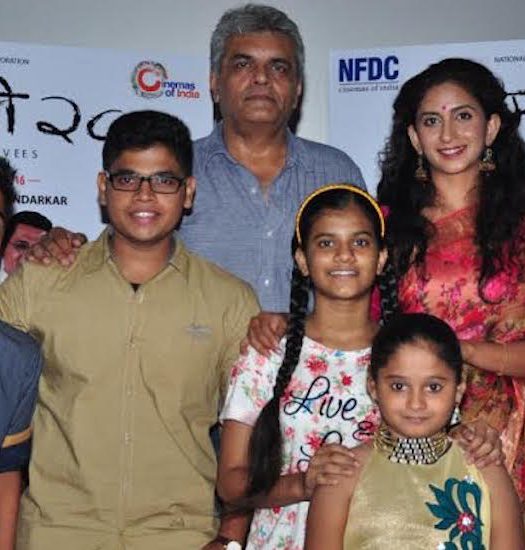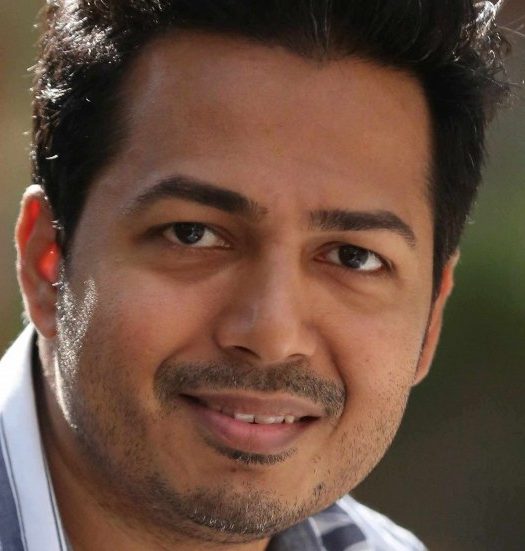The location has immensely added to the narrative of Coffee Bloom – Manu Warrier
It started off as an Indie film but as luck would have it, Coffee Bloom grew into a full-fledged mainstream feature. Director Manu Warrier takes us through the journey of his debut film that will have a theatrical release on March 6. The film produced by Speaking Tree Pictures and distributed by Long Live Cinema had its India premiere at the Mumbai Film Festival 2014.

Director Manu Warrier (Left)
Have you always wanted to be a filmmaker? How did the move from writing to direction happen?
Yes, I’ve always wanted to be a filmmaker, there were no two ways about that. I came to the industry to make movies. However when I started pitching my stories I realized that nobody is going to fund a filmmaker who has not made anything. And I had to get my bread and butter sorted, so I took up writing, more as a survival aid. I also understood that there were very few screenwriters in Bollywood who developed ideas and concepts for the directors. You always have screenwriters with their own ideas. I wanted to develop scripts for other directors. I thought it would give me a chance to collaborate with a lot of people and learn a lot of things. And I started enjoying writing and it gave me another learning experience. Eventually I always wanted to direct, so kept pitching ideas and this project (Coffee Bloom) took off.
Tell us about the idea behind Coffee Bloom. Were there any influences, real life or otherwise?
My co-writer, Sharath Parvathavani and I had worked on a short film earlier. We got together again and decided to tell an effective story with minimum resources and without spending a lot. We started writing the story and thought it should be a relationship drama, so we started drawing influences from the people we knew. We came across this idea about a man who doles out advice to others and then his own life becomes a mess. We thought that developing such an idea would be interesting. Also, Sharath had written this other script and we ended up adapting a lot of elements from that one into this. We wanted to set this movie in a particular place and in the process traveled to Coorg. We saw this coffee plantation there, learnt about it from the owners and realized that it’s a phenomenon not captured on screen. So we decided to marry all these ideas and build them together. And things started falling in place.
Was funding the film easy? How did Harish Amin come on board?
Initially we planned to fund it ourselves, with Sharath agreeing to put in a major chunk. But the logistics and the practicality of the whole process dawned on us and we realized that it’s not feasible in our budget. And I happened to tell this to Leena Yadav (filmmaker) and she asked me to meet Harish Amin of Speaking Tree Pictures. Harish had just completed Oonga at that time and was looking out for something to produce. I just met him to get some support funds and he really liked the idea and decided to scale it up. He later told me that everyone in his office opposed the idea and he was the only one who believed in it. And that’s how it got scaled up to be a mainstream film, from what was supposed to be an indie film.
Were you apprehensive about making a debut with a romantic drama?
Not at all. Once we had the whole script, we were confident to go ahead with it. Later when we had a Producer on board we got more excited and Harish gave us all the support. We knew that if there are people who are appreciating this idea, right from the Producer then we were on the right track. The only apprehension now is how the audience will eventually respond to the film.
Take us through the casting process for the lead actors – Arjun Mathur, Sugandha & Mohan Kapur?
When Harish Amin decided to do the project he was very clear that we should have professional actors. That would also make the movie more accessible. Once the pre-production started, there was a particular part in the script that had to be shot quickly because of the climate. So we had this rush to cast someone. Tess Joseph, the casting director, gave us options and we zeroed in on Arjun Mathur. He heard the narration, we had a few meetings and he was on board instantly. Arjun suggested Sugandha and Tess also knew her. We sent the script to her and she agreed. There wasn’t much of an audition. The feedback of the script that Sugandha shared suggested that she had understood the story and character very well. Mohan Kapur was also recommended by Tess, he instantly connected with the character and wanted to do it.

What preparation process did you adopt for them?
Since we had to quickly shoot in a particular time period we first had some readings amongst the actors in our office. On the sets we would discuss the role and rehearse post our shoots at night. There were days when the actors were given a lot of time to immerse into their roles. We just followed the standard procedure of readings and understanding the characters.
The film looks visually aesthetic. What was the visual treatment adopted?
When we decided to shoot in Coorg, we knew that the place was very beautiful. So we didn’t want a DOP to come and add a lot more to it or stylize it further. We kept the approach simple, be it in terms of shot taking or color tones, there was no major treatment plan. We wanted to capitalize on the location so kept the camera work non-intrusive and worked out a lot of things in a minimalistic way. And the location has immensely added to the narrative.
Is music a vital part of the film? What kind of musical composition should one expect?
Songs are a vital part of the narrative. Prasad Ruparel has composed the music for the film. We adopted a classical approach for the background score rather than a new age feel. The songs were used more as a narrative than lip sync. I feel that lip sync takes away from the storytelling element unless it justifies the story.
How would you describe the experience of making your first film?
There have been a lot of ups and downs but when it all comes together, it’s the experience that makes you wiser. Many people say that you don’t learn anything from your first film but I’ve learnt a lot from this experience.
Your debut film releases in USA & Toronto as well. How did you’ll go about choosing & tapping these markets?
The man behind that is Shiladitya Bora of Long Live Cinema and he can elaborate on the details. The idea was to tap into a population where there is more of an Indian diaspora. And when he made it happen we realised that we were among the few films to get a simultaneous release across India, Canada and USA. That is something that has been very positive for us.
Can you share key points/advice that every first time filmmaker should keep in mind?
The only thing I would say is to stick to your conviction more than anything else. Believe in yourself and focus on making your film. There are no shortcuts. You just figure out ways to make it happen.
Which filmmakers and films have inspired you?
I grew up with a lot of Malayalam films. Several filmmakers like Mani Ratnam and Santosh Sivan have been a major influence. I then moved on to Bollywood films and liked Ram Gopal Varma’s work. There were several others also but these were the main influences that largely shaped me.
Are you working on any other projects?
I’m committed to a Marathi film based on the Indian bureaucracy. And I’m also developing a Malayalam thriller.



